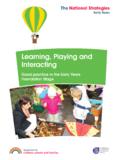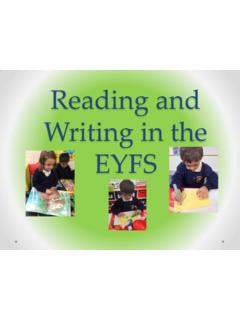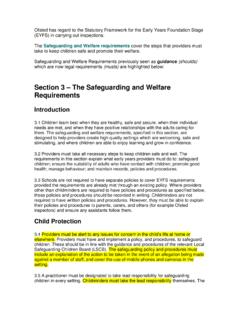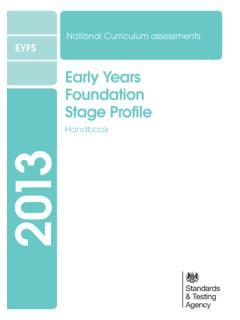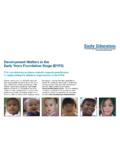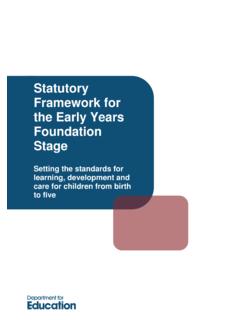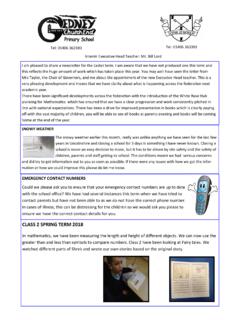Transcription of Key messages - KEAP
1 The early Years Foundation stage 00012-2007 CDO-ENEffective practice: Play and Exploration Crown copyright 200701 Effective practice: Play and ExplorationKey messagesChildren learn through first-hand experience, in activities they have can involve a child playing alone, alongside another child, or cooperatively with another child, children and or an are given opportunities to test their ideas, themselves, their relationships and and exploration promotes brain and adults can make and learn from their fosters imagination and flexibility of mind, promoting children s ability to be players now and in the s competences and confidence are developed through are given opportunities to explore their fears and anxieties in their play children s concepts, skills, attitudes and achievements are practitioners evaluate the extent to which they provide for all children s learning dispositions and to which the children are able to change the dispositional milieu of their , enabling environments, with sufficient and appropriate safe space and equipment, are should allow children to dictate the pace, length and focus of activities and any interventions should be subtly , sensitive key people recognise and provide for babies and young children s fascination with and curiosity about what is going on in their Play and Exploration meansPlay and Exploration in early years settings means children are able to choose activities where they can engage with other children or adults or sometimes play alone.
2 And during those activities they learn by first-hand experience by actively doing . They need sufficient space, time and choice with a range of activities, some of which have been planned and prepared by the practitioners on the basis of their observations of individual children s current interests, learning styles and stages of play has been acknowledged as difficult by many authors and researchers, some arguing that it is easier to say what play is not than what it is. Observing children playing might lead one to assume that play is any or all of the following: a social learning device; a cognitive learning device; a physical learning device; fun and freedom; therapy; occupation while adults are busy. Play is said to happen in societies all over the world and is recognisable in other species, particularly in the flexibility of play and of playful minds is currently being vaunted as the most suitable approach to future life in our fluid, multi-media, global society.
3 Certainly in countries such as China, where early The early Years Foundation stage 00012-2007 CDO-ENEffective practice: Play and Exploration Crown copyright 200702childhood education and care has traditionally been quite didactic and formal, there is much interest in the education of young children through play (David and Powell, 2005). Knowing how to be a player may be an important attribute and one that children can acquire only through experience. Play is a means of dealing with problems and of gaining control over one s life. It helps people of any age to be proactive and dynamic, autonomous learners rather than people to whom life happens (Moyles, 2005). Play helps young children to be competent learners who can make connections and who can create and transform ideas and knowledge, because they are imaginative and (2001) suggests that free-flow play is coordinated, moves fluidly from one phase or scenario to the next and makes young children feel powerful and contented.
4 She emphasises that: Children at play are able to stay flexible, respond to events and changing situations, be sensitive to people, to adapt, think on their feet, and keep altering what they do in a fast-moving scene. When the process of play is rich, it can lead children into creating rich products in their stories, paintings, dances, music making, drawings, sculptures and constructions, or in the solving of scientific and mathematical problems. (Bruce, 2001, )In free-flow play children:use first-hand experiences from life;make up rules as they play in order to keep control;symbolically represent as they play, making and adapting play props;choose to play they cannot be made to play;pretend;sometimes play alone;play with adults and other children, cooperatively in pairs or groups;have individual play agenda, which may or may not be shared;are deeply involved and difficult to distract from their deep learning as they wallow in their play and learning;try out their most recently acquired skills and competences, as if celebrating what they know;coordinate ideas and feelings, and make sense of relationships with their families, friends, cultures.
5 (Adapted from Bruce, 2004, )Play also has the advantages that a child can move in and out of the play and they can pick up play narratives where they left off. They can recall and repeat earlier play bouts and this provides a starting point for ease in their next encounter with a familiar playmate, for example, another child, an older sibling or a grandparent. Play is also multi-layered. Children build on their earliest experiences, and often at the heart of the very complex play bouts of older children, one can glimpse the contributions of earlier play children may begin by exploring and experimenting with what interests them by looking about, listening to and taking in the smells of their home or early years setting, observing what goes on there and how the people in it behave.
6 They may touch objects, move around the spaces, manipulate The early Years Foundation stage 00012-2007 CDO-ENEffective practice: Play and Exploration Crown copyright 200703things, ask questions, as if they are seeking answers to the question What does this do? . This period of play and exploration has been called the epistemic phase (the gathering knowledge phase; Hutt et al., 1989) and it is typified by concentration and a serious facial expression. When children feel confident they have some knowledge they will move into a ludic phase of play (the fun phase), as if they are asking the question What can I do with this? . Both phases are equally important and link to Piaget s idea of assimilation and accommodation, where new knowledge is at first absorbed into and often understood in terms of previous knowledge.
7 Then all relevant knowledge is adjusted as it becomes clear that the new knowledge has brought a different, challenging perspective that means the old knowledge needs expanding or and learning take place in contexts that are familiar to the children involved. They share experiences and understandings, talk and thinking with the other children and the adults who join in the play and explorations. Learning is a social activity (Vygotsky, 1978). Our ideas are shaped by interactions with people who are important in our lives, and together we co-construct our understanding of our world and how we live in it. For young children, understanding and making sense of the world is rooted in what they know and everyday events in their lives. It often includes incorporating stories and characters from books, videos and DVDs, games and TV (such as superheroes).
8 Play helps children come to terms with the underlying meanings people in different communities share: The most strenuous period of imaginative activity is that time in childhood when we play with the boundaries of our view of the world: sense and nonsense, the real and the fictive, the actual and the possible, all within the cultural domain we inhabit. (Meek, 1985, )Loris Malaguzzi, one of the founders of the now famous nurseries in Italy s Reggio Emilia region, argued that young children: Have the privilege of not being excessively attached to their own ideas, which they construct and reinvent continuously. They are apt to explore, make discoveries, change their points of view and fall in love with forms and meanings that transform themselves. (quoted in Edwards et al., 1998, )This ability of play and exploration to transform understandings can also be seen in how each child s individual brain is transformed.
9 Play interactions at around the age of 18 months impact on brain development (Gopnik et al., 1999) as this is when most young children begin to realise their own mind is different from that of others. This is the time when they may start to use the word I and to be aware that other people do not necessarily like what they like. Additionally, we often use the term play to describe the recreational activities of adults and so we might think children s play is recreation. But we might also reflect that when very young children play, they are engaging in the creation of who they are and the beliefs they hold, not re-creation (David, 1996).Why Play and Exploration is importantPlay and Exploration is important because it offers opportunities for:making choices and decisions;using one s own ideas and imagination;experimenting;trying out new behaviours and practising old ones; The early Years Foundation stage 00012-2007 CDO-ENEffective practice: Play and Exploration Crown copyright 200704practising skills and learning new ones;exercising, developing and coordinating body, mind and brain;adapting or transforming knowledge, attitudes and skills;negotiating;following an interest or line of enquiry;engaging in What if?
10 Activity;making up rules and changing them;making mistakes;demonstrating one s competence in many areas of development;setting one s own goals;trying to emulate someone else;using symbols;making sense of puzzling situations, events or equipment;becoming and being confident and enjoying challenges;having fun with friends and/or familiar adults;learning how to be a player fit for life in a high-tech, post-industrial practice in relation to Play and ExplorationLearning through experienceChildren engaged in play and exploration are learning through experience, because young children s development and learning, whether physical, social, emotional, moral or cognitive, requires real, hands-on engagement it cannot be done by means of a worksheet. In play, children can express their fears and re-live anxious experiences in controlled and safe situations.

